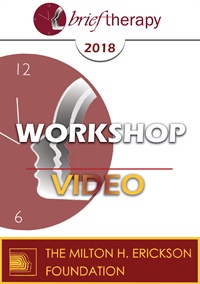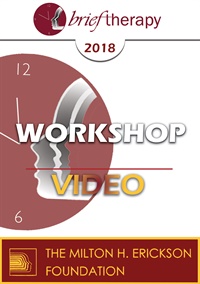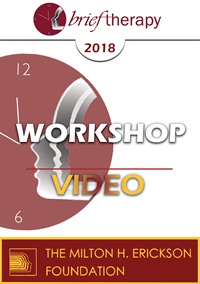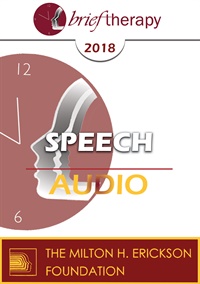
- Average Rating:
- Not yet rated
- Topic Areas:
- Speeches | Brief Therapy | Ericksonian Hypnosis and Therapy Techniques | Therapist Development
- Categories:
- Brief Therapy Conference | Brief Therapy Conference 2018
- Faculty:
- Jeffrey Zeig, PhD
- Duration:
- 1:00:38
- Format:
- Audio Only
- Original Program Date:
- Dec 09, 2018
- Short Description:
- One way of modeling Milton Erickson is to consider the states that he commonly inhabited when he was conducting psychotherapy. Erickson "states" will be described and examples will be provided.
- Price:
- $15.00 - Base Price
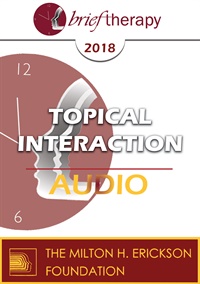
- Average Rating:
- Not yet rated
- Topic Areas:
- Topical Interactions | Brief Therapy | Psychotherapy | Hypnosis
- Categories:
- Brief Therapy Conference | Brief Therapy Conference 2018
- Faculty:
- Michael Yapko, PhD
- Duration:
- 1:00:04
- Format:
- Audio Only
- Original Program Date:
- Dec 08, 2018
- Short Description:
- This session explores the role of hypnosis in brief psychotherapy, highlighting its therapeutic potential beyond myths and misconceptions. Drawing on neuroscience and clinical practice, the discussion shows how hypnosis redirects attention, mobilizes hidden resources, and enhances the effectiveness of other approaches. Participants gain a deeper understanding of how experiential absorption can facilitate change in pain relief, emotional regulation, and resilience.
- Price:
- $15.00 - Base Price
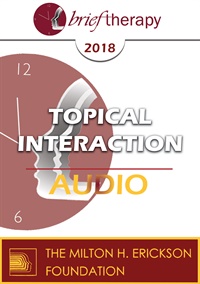
- Average Rating:
- Not yet rated
- Topic Areas:
- Topical Interactions | Couples Therapy | Love | Solution Oriented Approach | Brief Therapy
- Categories:
- Brief Therapy Conference | Brief Therapy Conference 2018
- Faculty:
- Elliott Connie, MA, LPC
- Duration:
- 58:58
- Format:
- Audio Only
- Original Program Date:
- Dec 08, 2018
- Short Description:
- Since the Solution Focused Approach is conversational in nature, and, based on questions, the clinician who is working with couples needs to be comfortable asking these kinds of questions when there are more than one person in the room. This can be tricky due to the nature of couples therapy. This talk will center on how to conduct couples session using this approach and how to use the question process to navigate even the trickiest sessions.
- Price:
- $15.00 - Base Price
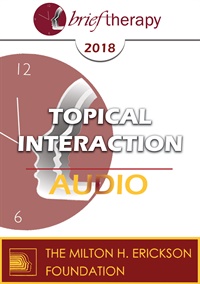
- Average Rating:
- Not yet rated
- Topic Areas:
- Topical Interactions | Anxiety | Brief Therapy | Children and Adolescent Therapy | Community | Depression
- Categories:
- Brief Therapy Conference | Brief Therapy Conference 2018
- Faculty:
- Lynn Lyons, LICSW
- Duration:
- 1:03:32
- Format:
- Audio Only
- Original Program Date:
- Dec 08, 2018
- Short Description:
- Educators are being asked to do more and more to support the emotional wellbeing of students and understand the mental health needs of their students. Programs are consistently being introduced and professional development offered. What's working and what isn't? How much can we expect of teachers and administrators? How is the collaboration and communication between parents, schools, and outside providers going? And what are students actually earning in about their mental health in school?
- Price:
- $15.00 - Base Price
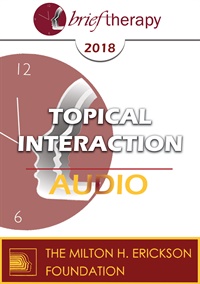
- Average Rating:
- Not yet rated
- Topic Areas:
- Topical Interactions | Brief Therapy | Communication | Evocative Communication | Resources
- Categories:
- Brief Therapy Conference | Brief Therapy Conference 2018
- Faculty:
- Bill O'Hanlon, MS
- Duration:
- 53:03
- Format:
- Audio Only
- Original Program Date:
- Dec 08, 2018
- Short Description:
- What can brief therapy work? In this session, Bill O'Hanlon will make the case that it involves evocation of already existing resources, so the client doesn't have to be fixed, taught new skills or make major changed to resolve problems.
- Price:
- $15.00 - Base Price
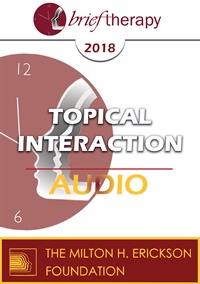
- Average Rating:
- Not yet rated
- Topic Areas:
- Topical Interactions | Anorexia | Eating Disorders | Bulimia | Brief Therapy
- Categories:
- Brief Therapy Conference | Brief Therapy Conference 2018
- Faculty:
- Camillo Loriedo, MD, PhD
- Duration:
- 1:00:27
- Format:
- Audio Only
- Original Program Date:
- Dec 08, 2018
- Short Description:
- Various attempts to treat these disturbances briefly have been made, but in most cases they proved to be unsuccessful due a very high relapse rate. To avoid a fearsome chronicity, a number of other factors, like alexithymia, low self-esteem, perfectionism, dissociation, dichotomous thinking, and others should be considered for treatment. Indications of how to deal with these factors in Ericksonian Brief Therapy will be offered.
- Price:
- $15.00 - Base Price
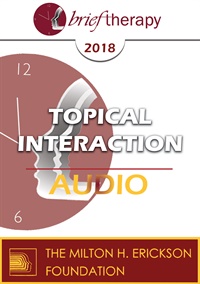
- Average Rating:
- Not yet rated
- Topic Areas:
- Topical Interactions | Psychotherapy | Brief Therapy | Therapeutic Relationship | Therapist Development
- Categories:
- Brief Therapy Conference | Brief Therapy Conference 2018
- Faculty:
- Stephen Gilligan, PhD
- Duration:
- 1:04:33
- Format:
- Audio Only
- Original Program Date:
- Dec 08, 2018
- Short Description:
- Every meaningful therapy conversation includes a significant presence of difficult emotions--symptoms, responses, anger, fear, etc. We will have a conversation about how to skillfully welcome and utilize such negative experiences as integral parts of a successful, creative therapy.
- Price:
- $15.00 - Base Price
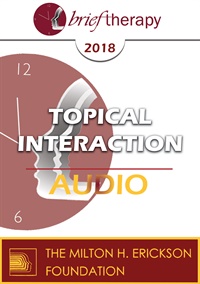
- Average Rating:
- Not yet rated
- Topic Areas:
- Topical Interactions | Brief Therapy | Milton Erickson
- Categories:
- Brief Therapy Conference | Brief Therapy Conference 2018
- Faculty:
- Jeffrey Zeig, PhD
- Duration:
- 57:25
- Format:
- Audio Only
- Original Program Date:
- Dec 08, 2018
- Short Description:
- Describe and exemplify essentials of Milton Erickson's approach to Brief Therapy.
- Price:
- $15.00 - Base Price
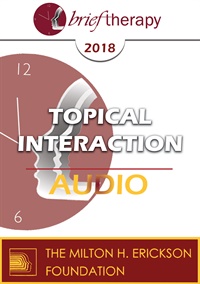
- Average Rating:
- Not yet rated
- Topic Areas:
- Topical Interactions | Belief Systems | Brief Therapy | Therapist Development
- Categories:
- Brief Therapy Conference | Brief Therapy Conference 2018
- Faculty:
- Robert Dilts, BA
- Duration:
- 1:00:27
- Format:
- Audio Only
- Original Program Date:
- Dec 08, 2018
- Short Description:
- Our beliefs are a very powerful force upon our behavior. It is common knowledge that if someone really believes he can do something he will do it, and if he believes something is impossible no amount of effort will convince him that it can be accomplished. Times of change and crisis bring out the significance of our beliefs even more strongly. The beliefs and stories (mental models and assumptions) that we and others hold during an unstable or crucial time determine the degree of resourcefulness with which we will face the situation. Empowering beliefs help us to identify and take best advantage of potential opportunities, while limiting beliefs focus us on danger and can trap us into old survival strategies (i.e., attack, retreat, freeze, etc.). This interaction will explore how to identify and work with the belief issues that arise during brief therapy.
- Price:
- $15.00 - Base Price
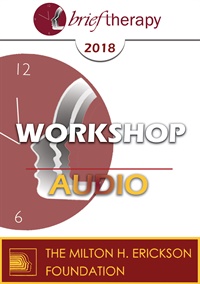
- Average Rating:
- Not yet rated
- Topic Areas:
- Workshops | Brief Therapy | Interviewing | Solution Oriented Approach
- Categories:
- Brief Therapy Conference | Brief Therapy Conference 2018
- Faculty:
- Elliott Connie, MA, LPC
- Duration:
- 1:13:19
- Format:
- Audio Only
- Original Program Date:
- Dec 07, 2018
- Short Description:
- Since the Solution Focused Approach is a questions based process, it is essential that clinicians learn the art of asking the kinds of questions that lead towards sustainable questions in their clients' lives. This means your learning has to go beyond theory and technique, instead being about language. This workshop will be about this question process. The facilitator will demonstrate 5 different categories of SFBT questions showing how to ask such questions in a way that leads towards the kind of client responses that are likely to lead towards change.
- Price:
- $15.00 - Base Price
Credit available - Click Here for more information
- Average Rating:
- Not yet rated
- Topic Areas:
- Workshops | Brief Therapy | Evocative Communication | Metaphors | Strategic Therapy | Utilization | Psychotherapy
- Categories:
- Brief Therapy Conference | Brief Therapy Conference 2018 | Online Continuing Education
- Faculty:
- Jeffrey Zeig, PhD
- Course Levels:
- Master Degree or Higher in Health-Related Field
- Duration:
- 1:45:53
- Format:
- Audio and Video
- Original Program Date:
- Dec 07, 2018
- Short Description:
- Three evocative orientations to psychotherapy, utilization, using metaphor, and strategic development, will be explained, demonstrated and practiced. There are components to each of these methods that will be addressed.
- Price:
-
Sale is $29.00
price reduced from Base Price - $59.00
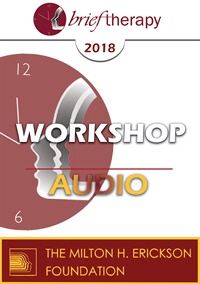
- Average Rating:
- Not yet rated
- Topic Areas:
- Workshops | Couples Therapy | Hypnosis | Trance | Family Therapy | Brief Therapy | Resources | Resistance
- Categories:
- Brief Therapy Conference | Brief Therapy Conference 2018
- Faculty:
- Camillo Loriedo, MD, PhD
- Duration:
- 1:58:55
- Format:
- Audio Only
- Original Program Date:
- Dec 07, 2018
- Short Description:
- Hypnosis will be presented within a system perspective, as a circular and evolving process, while couples and families will be considered as a source of natural healing resources that the therapist should discover and activate. Specific direct and indirect techniques required to induce a deep and meaningful change of the most rigid family patterns will be introduced. The demonstration of a family hypnotic session will give a clear idea of the powerful and subtle resistances families can develop in the course of the hypnotic treatment as well as of how naturalistic systemic hypnosis can transform these resistances in the required solutions.
- Price:
- $15.00 - Base Price
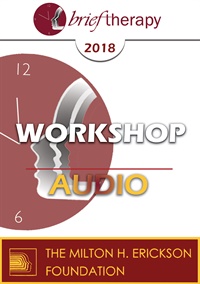
- Average Rating:
- Not yet rated
- Topic Areas:
- Workshops | Brief Therapy | Therapeutic Relationship | Therapist Development
- Categories:
- Brief Therapy Conference | Brief Therapy Conference 2018
- Faculty:
- Bob Bertolino, PhD
- Duration:
- 1:59:16
- Format:
- Audio Only
- Original Program Date:
- Dec 07, 2018
- Short Description:
- Effective clinicians draw on various sources of external knowledge to inform practice. One source can be found in the models of today which are popularized in numerous books and training opportunities. A second source is comprised of discoveries in fields such as medicine, education, philosophy, art, spirituality, and the sciences. Although these two sources provide a wealth of knowledge, effective practitioners also rely on a third source that not only serves as a foundation for practice but also informs treatment strategies. The third source is rooted in traditional psychotherapy theories and the contributions of early pioneers.
- Price:
- $15.00 - Base Price
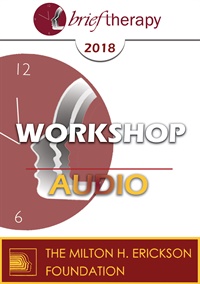
- Average Rating:
- Not yet rated
- Topic Areas:
- Workshops | Multicultural | Trauma | Brief Therapy | Mindfulness
- Categories:
- Brief Therapy Conference | Brief Therapy Conference 2018
- Faculty:
- Laura Brown, PhD
- Duration:
- 1:59:58
- Format:
- Audio Only
- Original Program Date:
- Dec 07, 2018
- Short Description:
- Just as human beings are not generic, so, too, trauma is an event that is affected by and interacts with people's intersectional identities. This workshop will introduce participants to a mindful model for understanding how to move towards cultural competence in practice with trauma survivors. We will pay particular attention to therapist countertransference/fragility, and to the effects of shame, guilt, privilege, and dominant culture narratives on trauma treatment. Some experience working with trauma survivors is assumed.
- Price:
- $15.00 - Base Price
Credit available - Click Here for more information
- Average Rating:
- Not yet rated
- Topic Areas:
- Workshops | Brief Therapy | Cognitive Behavior Therapy (CBT) | Therapist Development | Anxiety | Depression | Resistance
- Categories:
- Brief Therapy Conference | Brief Therapy Conference 2018 | Online Continuing Education
- Faculty:
- David Burns, MD | Jill Levitt, PhD
- Course Levels:
- Master Degree or Higher in Health-Related Field
- Duration:
- 2:00:37
- Format:
- Audio and Video
- Original Program Date:
- Dec 07, 2018
- Short Description:
- Dr. David Burns and his colleague, Dr. Jill Levitt, will do live therapy with an audience volunteer who’s been struggling with depression and anxiety. They will give you the unique opportunity to go behind closed doors to see how TEAM-CBT actually works in real time. When you witness the rapid transformation of intense self -doubt into joy, relief, and enlightenment, you will feel much better about yourself, while at the same time learning some awesome new tools that you can use right away to improve your clinical outcomes. This promises to be an exciting, educational and inspirational experience!
- Price:
-
Sale is $29.00
price reduced from Base Price - $59.00
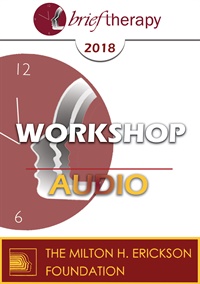
- Average Rating:
- Not yet rated
- Topic Areas:
- Workshops | Brief Therapy | Therapist Development
- Categories:
- Brief Therapy Conference | Brief Therapy Conference 2018
- Faculty:
- Michael Yapko, PhD
- Duration:
- 2:04:42
- Format:
- Audio Only
- Original Program Date:
- Dec 07, 2018
- Short Description:
- This workshop demonstrates how asking “how” questions can transform therapy by helping clients move beyond global thinking into clearer, more effective decision-making. Through vivid examples—ranging from career setbacks to relationship struggles—participants see how guiding clients to distinguish between what they can and cannot control reduces helplessness, sharpens choices, and fosters resilience.
- Price:
- $15.00 - Base Price
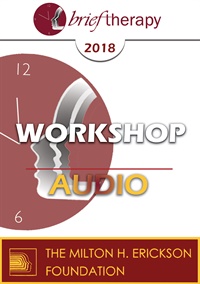
- Average Rating:
- Not yet rated
- Topic Areas:
- Workshops | Hypnosis | Brief Therapy | Music | Therapist Development
- Categories:
- Brief Therapy Conference | Brief Therapy Conference 2018
- Faculty:
- Norma Barretta, PhD | Jolie Barretta
- Duration:
- 1:54:14
- Format:
- Audio Only
- Original Program Date:
- Dec 07, 2018
- Short Description:
- This workshop explores how sound and hypnosis can be blended to deepen trance, accelerate change, and support emotional and physical healing. Participants learn how vocal tone, rhythm, frequency, and simple sound tools interact with attention and imagery to influence perception, physiology, and pain. Through live demonstrations and clinical reflection, the session offers a hands-on look at how sound can amplify hypnotic work and expand therapeutic options across a wide range of clinical concerns.
- Price:
- $15.00 - Base Price
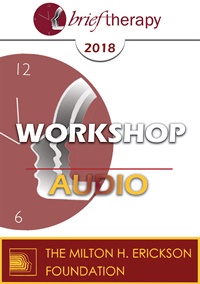
- Average Rating:
- Not yet rated
- Topic Areas:
- Workshops | Anxiety | Brief Therapy | Children and Adolescent Therapy | Depression | Family Therapy
- Categories:
- Brief Therapy Conference | Brief Therapy Conference 2018
- Faculty:
- Lynn Lyons, LICSW
- Duration:
- 2:00:14
- Format:
- Audio Only
- Original Program Date:
- Dec 07, 2018
- Short Description:
- The most frequent complaint I hear from parents about the treatment they receive for their child's anxiety? "No one told us what to DO!" Anxiety is often generational, and by the time a family arrives at your office, they have been in the grips of the cult leader called anxiety for years. Worse yet, many of the things they have been doing, although loving and supportive, are actually making the anxiety stronger. This workshop will describe how to give families immediate and active solutions from the first session, including the use of front loading to provide critical information and understanding, changing the family's relationship with anxiety, and creating active interventions that are often the opposite of what they've typically been doing.
- Price:
- $15.00 - Base Price

- Average Rating:
- Not yet rated
- Topic Areas:
- Workshops | Brief Therapy | Generative Psychotherapy | Psychotherapy | Relationships | Therapist Development
- Categories:
- Brief Therapy Conference | Brief Therapy Conference 2018
- Faculty:
- Robert Dilts, BA
- Duration:
- 2:01:29
- Format:
- Audio Only
- Original Program Date:
- Dec 07, 2018
- Short Description:
- BT18 Workshop 14 - Applying Principles of Generative Coaching to Brief Therapy - Robert Dilts The core focus in Generative Coaching is creativity: How do you create a successful and meaningful work life? How do you create great personal relationships? How do you develop a great relationship with yourself—your body, your past, your future, your wounds, and your gifts? Generative change means creating something beyond what currently exists, whether in personal or professional life. It is not merely a cosmetic change, but a contextual shift that allows new levels of performance. Generative Coaching focuses on how to build the generative states needed to produce change and on how to maintain these states in order transform the obstacles and barriers that will inevitably arise.
- Price:
- $15.00 - Base Price
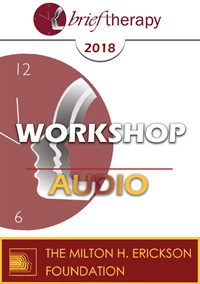
- Average Rating:
- Not yet rated
- Topic Areas:
- Workshops | Single-Session | Brief Therapy | Psychotherapy | Therapist Development
- Categories:
- Brief Therapy Conference | Brief Therapy Conference 2018
- Faculty:
- Michael Hoyt, PhD
- Duration:
- 1:35:35
- Format:
- Audio Only
- Original Program Date:
- Dec 07, 2018
- Short Description:
- Many therapies involve very brief lengths of treatment, including one session. A structure will be presented for organizing the tasks and skills involved in different phases (pre-, early, middle, late, follow-through) of therapy. Numerous case examples, including some on video, will illustrate brief therapy techniques applicable in both initial sessions and in the course of longer treatments.
- Price:
- $15.00 - Base Price
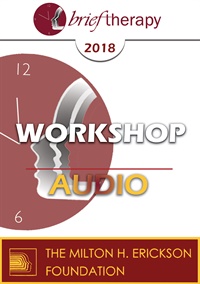
- Average Rating:
- Not yet rated
- Topic Areas:
- Workshops | Brief Therapy | Trauma | Pain and Healing
- Categories:
- Brief Therapy Conference | Brief Therapy Conference 2018 | Pioneers in Couples and Family Therapy
- Faculty:
- Janina Fisher, PhD
- Duration:
- 2:05:52
- Format:
- Audio Only
- Original Program Date:
- Dec 07, 2018
- Short Description:
- Janina Fisher presents a brief therapy model for trauma treatment, emphasizing the limitations of traditional talk therapy and the need for approaches suited to managed care. She explains how trauma is stored in implicit memory and reviews Bessel van der Kolk’s brain research. Fisher outlines a phase-oriented approach, incorporating psychoeducation, mindfulness, and right-brain-to-right-brain communication. She discusses neurofeedback’s effectiveness, sensory motor psychotherapy’s role in skill development, and strategies for stabilizing clients in unsafe situations.
- Price:
- $15.00 - Base Price
Credit available - Click Here for more information
- Average Rating:
- Not yet rated
- Topic Areas:
- Workshops | Depression | Continuing Education | Brief Therapy | Neuroscience | Psychopharmacology
- Categories:
- Brief Therapy Conference | Brief Therapy Conference 2018 | Online Continuing Education
- Faculty:
- Bill O'Hanlon, MS
- Course Levels:
- Master Degree or Higher in Health-Related Field
- Duration:
- 1:42:03
- Format:
- Audio and Video
- Original Program Date:
- Dec 07, 2018
- Short Description:
- Recent research and insights have given a new understanding of depression, not as a deficit in chemicals, but as a problem with neurogenesis (new brain growth and connection). Antidepressants may work by promoting brain cell and neuronal growth and connection, but there are other ways, within the grasp of therapists, counselors and addiction specialists that can make an immediate and lasting difference in helping relieve depression. This session will give three simple methods for relieving depression using insights from recent brain science.
- Price:
-
Sale is $29.00
price reduced from Base Price - $59.00
Credit available - Click Here for more information
- Average Rating:
- Not yet rated
- Topic Areas:
- Workshops | Brief Therapy | Therapeutic Relationship | Therapist Development | Neuroscience
- Categories:
- Brief Therapy Conference | Brief Therapy Conference 2018 | Online Continuing Education
- Faculty:
- Stephen Gilligan, PhD
- Course Levels:
- Master Degree or Higher in Health-Related Field
- Duration:
- 2:00:04
- Format:
- Audio and Video
- Original Program Date:
- Dec 07, 2018
- Short Description:
- By virtue of our "mirror neurons", it is impossible for therapists to not be deeply touched by client's experiences. We will explore how this can be done skillfully and safely, thereby opening multiple pathways of feedback, compassion, and technical competencies. Special attention will be to mindful activation of the three "minds" of somatic, cognitive, and relational field intelligence, again with the intent of creating a deep and sophisticated conversational connection.
- Price:
-
Sale is $29.00
price reduced from Base Price - $59.00
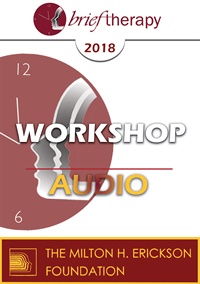
- Average Rating:
- Not yet rated
- Topic Areas:
- Workshops | Brief Therapy | LGBTQ | Multicultural | Trauma
- Categories:
- Brief Therapy Conference | Brief Therapy Conference 2018
- Faculty:
- Rick Miller, MSW
- Duration:
- 1:46:52
- Format:
- Audio Only
- Original Program Date:
- Dec 07, 2018
- Short Description:
- The relationship between gay sons and their mothers is fascinating based on the history of psychiatry pathologizing this bond, suggesting an enmeshment that contributed to the son being gay. Currently, this relationship consists of an empowering bond that contributes to a healthy sense of self in a world where acceptance isn’t necessarily prevalent. The actual key to wellbeing consists of receiving good enough mothering rather than total acceptance of his being gay. This presenter, a gay male author notes that there is little information on this topic, hence the inception Gay Sons and Mothers. This “docuseries” consists of photos and narratives depicting these bonds, video interviews portraying the emotional aspects of their relationships, as well as theory based on interviews and personal experiences.
- Price:
- $15.00 - Base Price
Tags: Gay LGBTQ Multi-Cultural Trauma
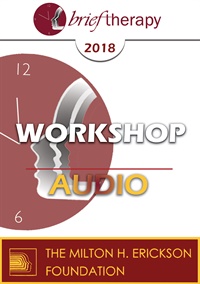
- Average Rating:
- Not yet rated
- Topic Areas:
- Workshops | Tailoring | Mindfulness | Psychotherapy | Brief Therapy
- Categories:
- Brief Therapy Conference | Brief Therapy Conference 2018
- Faculty:
- Ronald Siegel, PsyD
- Duration:
- 1:56:11
- Format:
- Audio Only
- Original Program Date:
- Dec 07, 2018
- Short Description:
- Mindfulness and compassion practices hold great promise not only for our own personal development, but also as remarkably powerful tools to augment virtually every form of psychotherapy. They are not, however, one-size-fits-all remedies. Practices need to be tailored to fit the needs of particular individuals—and this presentation will show you how to creatively adapt them to meet the needs of diverse people and conditions.
- Price:
- $15.00 - Base Price



